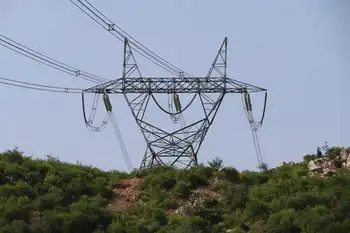Washington, DC - July 30, 2003 - The Senate was expected to vote on Wednesday on proposals that would stop the Federal Energy Regulatory Commission from finalizing new electricity market rules until mid-2005 and give the agency more power to review mergers in the U.S. utility sector.
Senate Republican leaders are trying to finish a broad energy bill with incentives for oil and natural gas drilling, energy conservation and electricity deregulation before adjourning Friday for a month-long August recess. A key issue for lawmakers is the proposed repeal of a Depression-era law that limits utility mergers. The Senate energy bill would repeal the Public Utilities Holding Company Act (PUHCA) of 1935, created as a trust-busting measure to prevent utilities from becoming too powerful. It would also give FERC limited power to review mergers. Democrat Jeff Bingaman of New Mexico on Tuesday night proposed an amendment that would give FERC more authority to prevent utilities from growing too big or from improperly transferring assets between parent and subsidiary units. Under the Republican plan, "a single company could acquire every generator in this country, and FERC could do nothing about it," Bingaman said. Some U.S. consumer groups oppose the repeal of PUHCA, saying that would trigger a round of mergers that would reduce competition in the power industry. The electricity industry and the U.S. Securities and Exchange Commission favor repeal of the law. The Senate was also debating whether FERC should be barred from finalizing its plan to rewrite U.S. electricity market rules and combine transmission grids into super-regional groups. Southern and Western lawmakers, whose states already have cheap electricity, oppose FERC's plan to make utilities join grid groups. A Republican proposal would stop FERC from moving ahead with its transmission grid rules as a package or piecemeal until July 1, 2005. Bingaman urged lawmakers to give FERC more flexibility. The Republican approach, he said, would prevent the agency from carrying out essential functions related to market oversight, transmission pricing or prospective rules for transmission grid groups. Another electricity-related amendment was offered by Democrat Maria Cantwell of Washington. Her proposal would broadly ban market manipulation, compared with a Republican plan that takes a more limited approach to trading strategies, with a ban on so-called "round-trip" trading -- bogus energy trades designed simply to boost revenue. "We are simply saying that market manipulation under the Federal Power Act cannot be 'just and reasonable,"' Cantwell said. Votes on the electricity proposals were expected on Wednesday. If the Senate manages to pass an energy bill, it would have to be reconciled with a House of Representatives measure approved in April. The House bill would repeal the utility holding company law.
A key issue for lawmakers is the proposed repeal of a Depression-era law that limits utility mergers.
The Senate energy bill would repeal the Public Utilities Holding Company Act (PUHCA) of 1935, created as a trust-busting measure to prevent utilities from becoming too powerful. It would also give FERC limited power to review mergers.
Democrat Jeff Bingaman of New Mexico on Tuesday night proposed an amendment that would give FERC more authority to prevent utilities from growing too big or from improperly transferring assets between parent and subsidiary units.
Under the Republican plan, "a single company could acquire every generator in this country, and FERC could do nothing about it," Bingaman said.
Some U.S. consumer groups oppose the repeal of PUHCA, saying that would trigger a round of mergers that would reduce competition in the power industry. The electricity industry and the U.S. Securities and Exchange Commission favor repeal of the law.
The Senate was also debating whether FERC should be barred from finalizing its plan to rewrite U.S. electricity market rules and combine transmission grids into super-regional groups. Southern and Western lawmakers, whose states already have cheap electricity, oppose FERC's plan to make utilities join grid groups.
A Republican proposal would stop FERC from moving ahead with its transmission grid rules as a package or piecemeal until July 1, 2005.
Bingaman urged lawmakers to give FERC more flexibility. The Republican approach, he said, would prevent the agency from carrying out essential functions related to market oversight, transmission pricing or prospective rules for transmission grid groups.
Another electricity-related amendment was offered by Democrat Maria Cantwell of Washington. Her proposal would broadly ban market manipulation, compared with a Republican plan that takes a more limited approach to trading strategies, with a ban on so-called "round-trip" trading -- bogus energy trades designed simply to boost revenue.
"We are simply saying that market manipulation under the Federal Power Act cannot be 'just and reasonable,"' Cantwell said.
Votes on the electricity proposals were expected on Wednesday.
If the Senate manages to pass an energy bill, it would have to be reconciled with a House of Representatives measure approved in April. The House bill would repeal the utility holding company law.
Related News

Notley announces plans to move Alberta's electricity grid to net-zero by 2035 if elected
CALGARY - Ahead of the NDP’s weekend convention, Alberta’s Opposition leader has committed to transforming the province’s energy sector and moving the province’s electricity grid to net-zero by 2035 should an orange crush wash over Alberta in the next election.
NDP Leader Rachel Notley said they would achieve this as part of the path towards Canada’s 2050 net-zero emissions goal, which will help preserve and create jobs in the province.
“I think it’s an important goal. It’s a way of framing the work that we’re going to do within our energy industry and our energy sector,” said Notley. “We know…




